10 Reputable Audit and IT Security Companies in Singapore With Complete IT System Security Audit Checklist
A security audit will provide a roadmap of your company's main information security flaws as well as determine if it is or isn't following the requirements it has set. Security audits are critical for organisations that handle private and sensitive data in order to develop risk assessments and mitigation strategies.
To guarantee that companies are properly safeguarding their clients' personal information, are following cybersecurity laws, and are avoiding liability and costly penalties, regular security evaluations are a must.
This article explores the benefits, the processes, and how security firms can help you not only assess your current security but also fill in any gaps. Take a look at our recommended security auditors and consultants in Singapore to find out what you need.
How a Thorough Security Audit Highlights Vulnerabilities and Risks that Can Harm Your Company’s Information System
When a company undergoes a security audit, information security professionals with expertise in cybersecurity and penetration testing will review the organisation's computer security system. The security auditors meet with key personnel to discuss their findings and offer recommendations for improvement where they see weaknesses.
Whether it's a finance company, small business, or nonprofit organisation, security audits are commonplace and critical in complying with regulations. Security auditors take into account organisational policies and government regulations while carrying out their work.
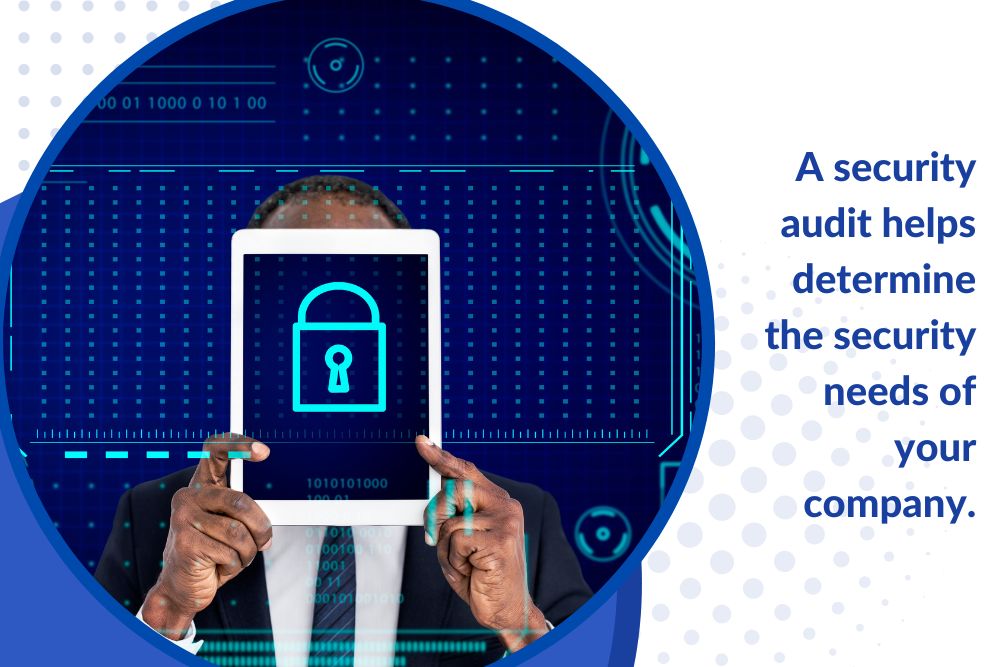
What is Security Audit?
A security audit is a thorough examination of your company's information system. Typically, this evaluation assesses the security of your information system against industry best practices, internationally established standards, or legislation.
A security audit analyses your organisation's many methods to test and evaluate its overall security posture, as well as other important matters like risk management. To reach your objectives and satisfy your business goals, you might use more than one form of cybersecurity audit.
An audit of a company's security measures evaluates the following areas:
- the physical components of your information system, as well as the surroundings in which it is housed
- the applications and software, including the implemented security patches
- network vulnerabilities, some of which include analyses of data as it travels between different points inside and outside your company's network
- the human aspect, such as how employees gather, distribute, and keep highly secure data
A security audit is vital for any company that wants to protect its networks, devices, and data from leaks, breaches, and criminal activity. Security audit is one of three primary types of cybersecurity evaluation procedures, alongside penetration testing and vulnerability assessment, both of which involve real-time testing on firewalls, malware, passwords, and data protection measures.
Importance of Data Security in the Enterprise
Cybersecurity news is everywhere these days, so you probably have a good idea of why regular audits are important. They help identify new vulnerabilities and potential problems that could arise from changes within the organisation. Also, some sectors like medical and financial services require these audits by law.
Here are some more specific benefits of running security audits.
- Verifies that your current security strategy is adequate
- Checks the security training efforts
- Shuts down or repurposes needless hardware and software to reduce cost
- Uncovers vulnerabilities introduced by new technology or processes
- Proves the organisation is compliant with regulations
- Protects the critical data resources of a company
- Complies with various security certifications
- Identifies security loopholes
- Keeps the company updated with proper security measures
- Identifies physical security vulnerabilities
- Helps in formulating new security policies
- Prepares the business for emergency response in case of a cybersecurity breach
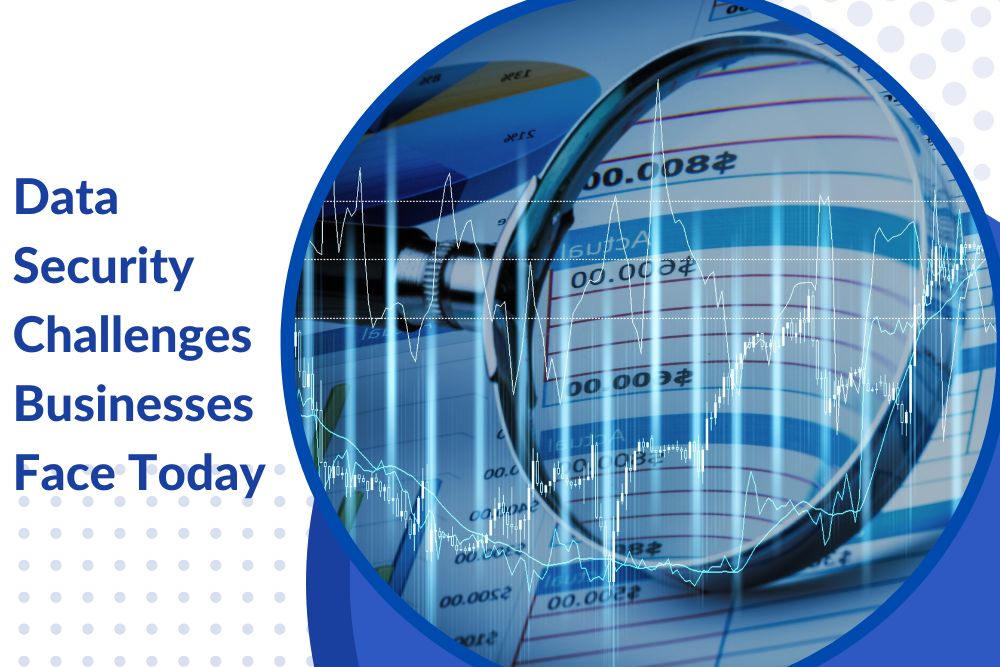
Data Security Challenges Businesses Face Today
When it comes to data security, there are a number of problems that companies confront. With the ever-changing climate of cybersecurity, staying up with all of the dangers has become increasingly difficult. Security auditing assist in spotting vulnerable spots in the defences and recommend strategies to remedy them.
- Data Breaches. In current years, data breaches have become ubiquitous, with large companies such as Target, Yahoo!, and Equifax experiencing attacks. If a company falls victim to a data breach, the repercussions can be significant—including loss of revenue and damage to its reputation.
- Insider Threats. Insider dangers are another major concern for businesses today. In some cases, it's an employee who inadvertently communicates critical information, such as by sending an email to the incorrect person. However, there have also been cases of workers stealing data maliciously on purpose.
- Advanced Persistent Threats. A persistent attacker is a form of cyber assault in which attackers gain access to a network and then stay there for an extended period of time, generally months or even years, before being discovered. They can steal critical data or launch additional attacks during this time.
- Distributed Denial of Service Attacks. A DDoS attack is a type of activity in which hackers flood a server with requests, causing it to crash. This may be extremely harmful to organisations since it might cause their website or other online services to go down.
- Ransomware Attacks. Ransomware is a type of malware that prevents victims from accessing important files unless they pay a ransom. This can be very detrimental to businesses.
Types of Security Audits
There are several ways to categorise an IT security audit. Usually, it is done according to the approach or methodology used. Some common types of categorisations are:
Use Cases
- One-Time Assessment. Assessments conducted only once are security audits normally done for special conditions or circumstances. For example, if you plan to use a new software platform, various tests and checks should be run first to discover any possible risks it might pose in your operation.
- Tollgate Assessment. A tollgate assessment is a security audit that only has two possible outcomes. It's a go or no-go audit to determine if introducing a new process or procedure into your environment is feasible. It's more focused on finding deal breakers rather than risks when conducting this type of assessment.
- Portfolio Assessment. An annual, bi-annual, or regular full security audit of your portfolio is called a security evaluation. These reviews will show whether your security procedures and processes are being followed and if they are adequate for the current business climate and demands.
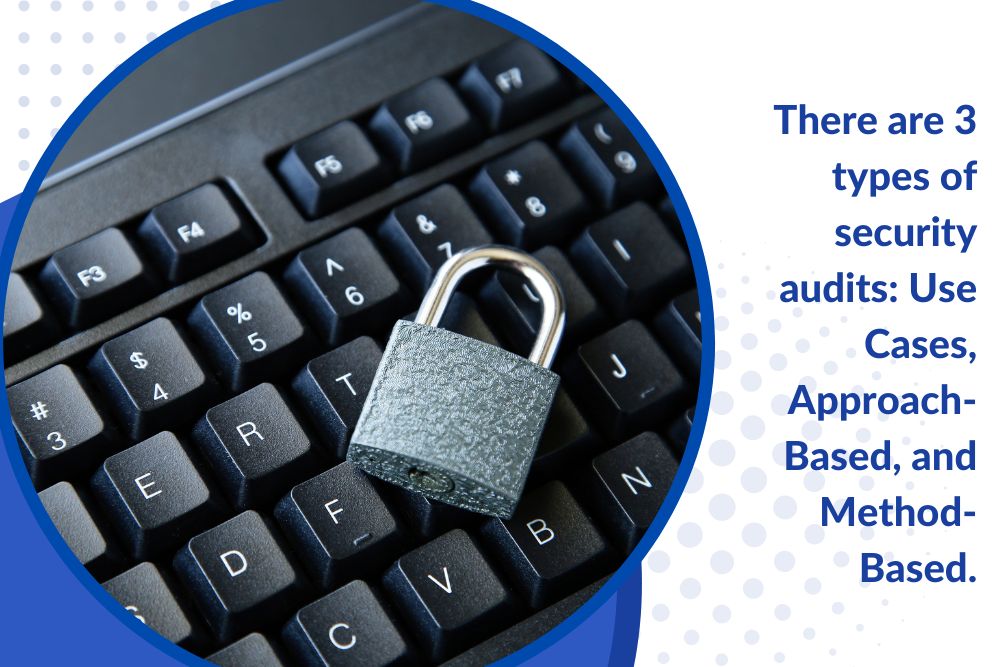
Approach Based
- Black Box Audit. The information collected by the auditor during a standard audit is limited to what is publicly available about the organisation being audited.
- White Box Audit. This type of security audit involves the auditor obtaining comprehensive information (such as source code or employee access) about the company to be investigated.
- Grey Box Audit. The auditors are given some information to start the audit process, which they could gather themselves but is provided to save time.
Methodology Based
- Penetration Tests. The auditor attempts to gain access to the organisation's infrastructure.
- Compliance Audits. Auditors only check certain security standards to see if the organisation is compliant.
- Risk Assessments. This procedure looks at the most important assets that might be jeopardised during a cyber attack.
- Vulnerability Tests. Auditors perform necessary scans to find possible security risks. However, many false positives may be present.
- Due Diligence Questionnaires. Conducts an analysis of existing security standards within the organisation.
When is Security Audit Done?
The frequency with which a company does security audits is determined by the sector it operates in, the requirements of its business and corporate structure, and the number of systems and applications that must be evaluated. Organisations that handle a lot of sensitive data---such as financial services and healthcare providers---are more likely to do inspections on a regular basis. External influences, such as regulatory obligations, also influence audit frequency.
At least once or twice a year, many businesses do a security assessment. However, they may be done on a monthly or quarterly basis as well. Depending on the systems, applications, and data that are used by various departments, routine inspections---whether conducted annually or monthly---may reveal anomalies or trends in the system.
Because most companies only have a few employees, doing quarterly or monthly audits may be more than they have time for. The complexity of the systems employed and the type and significance of the data in those systems influence how often an organisation utilises security auditing. If a system's data is deemed critical, it may be audited more frequently; however, complicated systems that take time to audit might be less frequently audited.
A company should regularly conduct security audits, especially after a data breach or system upgrade. Audits help determine any vulnerabilities in the system that may have led to the data breach. For example, if there was just a data leak, an audit of the affected systems can pinpoint where exactly things went wrong.
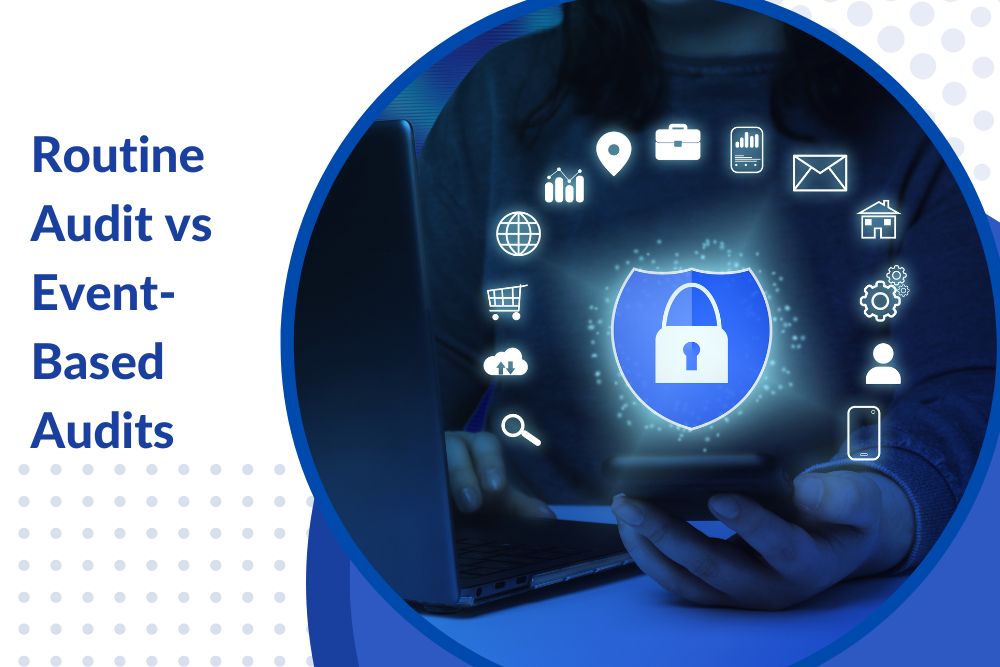
Routine Audits vs. Event-Based Audits
An organisation's long-term approach to safeguarding data and assets is necessary. This implies that audits should be completed on a yearly basis, but it is preferable to adjust security procedures more frequently. Best security practices are in constant flux as technology advances, so regular inspections will guarantee your firm stays ahead of the curve.
Experts recommend that your firm conduct security audits after an attack or significant software update. Both situations are classified as major events. The audit will focus on determining exactly what occurred and what went wrong in order to identify the leak following an assault, such as a data breach. Naturally, your staff will place special emphasis on resolving any issues that could lead to another leak.
After a major update, your environment will look very different from the last time an audit was conducted. In this case, an audit is a way to check for new vulnerabilities that might have been introduced with the large-scale change.
However, because full security audits take up so much time and resources, it's important to decide how big of an impact an update would need to make before you initiate an audit. This prioritisation ensures you are using your security team's resources in the most effective way possible.
Security Test, Assessment, and Audit: What are the Differences?
Security Audits vs. Cybersecurity Audits
Cybersecurity inspections are a type of security evaluation that is limited to the company's information systems. Given the many digital environments in which most businesses operate, it might be tempting to conflate them with security evaluations. However, focusing only on cybersecurity may lead to bias.
However, if someone can stroll straight in through the front door of your business and log on to a computer with administrator-level access, that's a serious problem. Security inspections that cover both physical and digital environments will look at the full range of possible risks and compliance concerns.
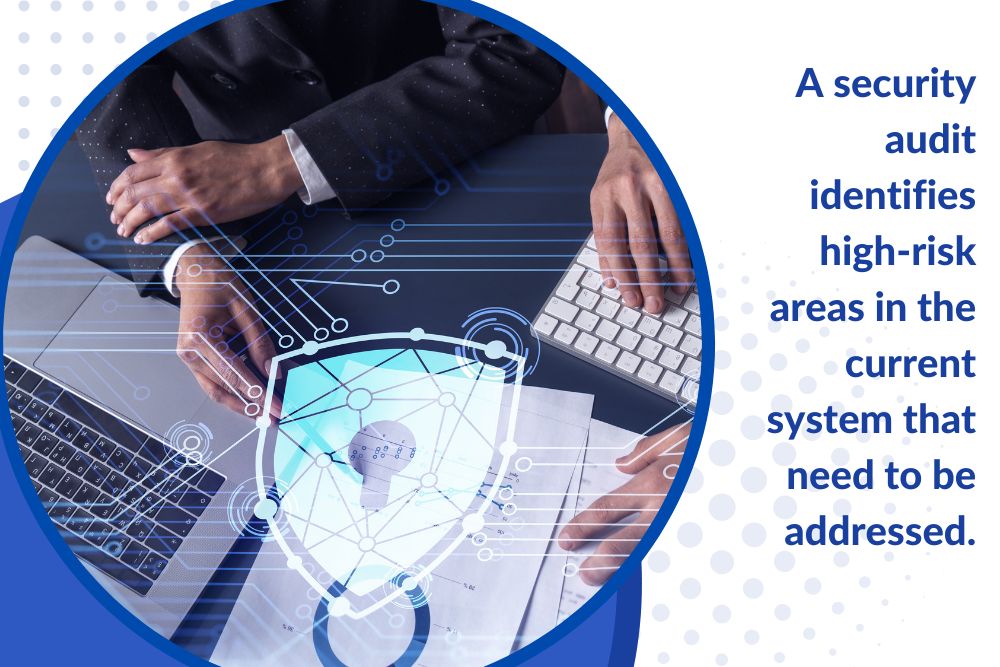
Security Audits vs. Vulnerability Assessments
Vulnerability scans are checks of software and IT infrastructure to see whether current security standards are working as expected. For instance, a user without administrative access should not be able to start the company's human resource program and remove another user.
A vulnerability scan would attempt this illicit action to determine if the user is blocked from doing so or how far he or she can go if they aren't.
Security Audits vs. Penetration Testing
Penetration testing simulates the actions of a bad actor trying to gain access to internal systems. Security teams act as if they are the attacker, starting from external networks and attempting to reach an organisation's network. Penetration testing verifies whether current tools and procedures offer adequate protection and identifies gaps for the security team to close.
Vulnerability assessments and penetration testing are two types of penetration testing, but the security staff will execute both to further analyse risks discovered in your audit or as standalone tests, so it's critical to know the differences.
Coverage of Security Audits
Security audits come in two forms, internal and external audits, that involve the following procedures:
- Internal Audits. These are conducted by a business using its own personnel and internal audit department. They tend to be used when an entity wants to check if its systems for procedure compliance adhere to policy.
- External Audits. An outside firm is brought in to perform an audit as part of these evaluations. External checks are also done when an organisation needs to verify that it is in accordance with industry norms or government rules.
External audits are divided into two categories: second- and third-party. Second-party audits are carried out by a company that provides the organisation being examined. Third-party inspections are conducted by an independent, impartial group of auditors; the people performing the audit have no ties to the business being evaluated.
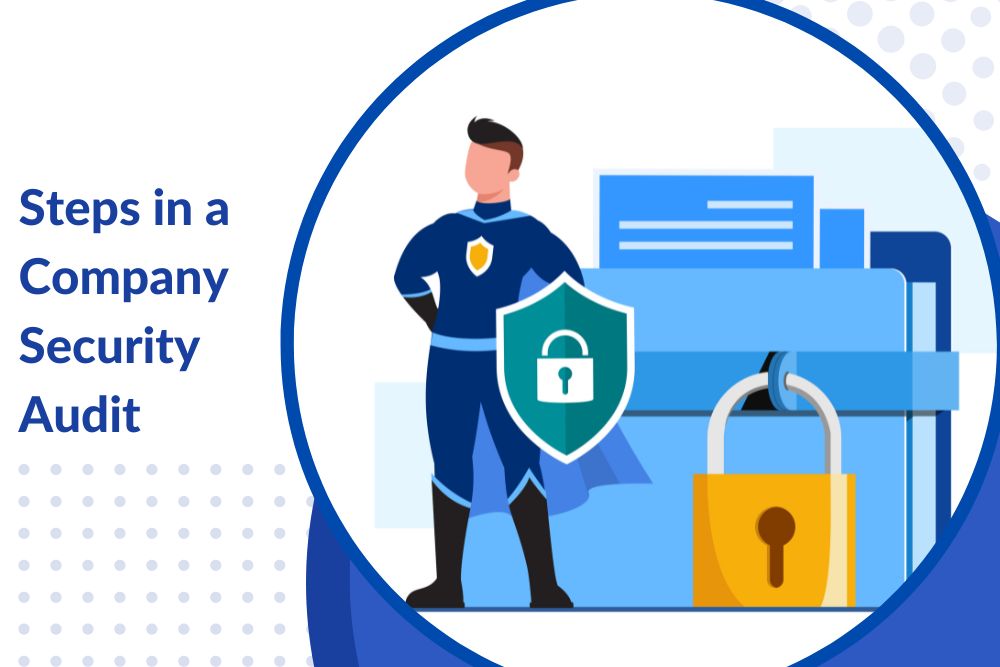
Phases of a Security Audit
A security audit is a comprehensive evaluation of your IT infrastructure, which encompasses operating systems, servers, digital communication and sharing platforms, applications, and data storage and processing procedures. Although the steps may vary depending on the compliance strategy your organisation needs to take, there are a few common components:
- Assessment Criteria Selection. To come up with your list of security features to analyse and test, first figure out which external standards you want or need to comply with. Also, make a note of any internal policies your IT team is aware of in case there are cybersecurity concerns that fall outside what the external criteria cover.
- Staff Training Assessment. The risk for human error rises with the number of people who have access to highly sensitive information. Check for a log of which employees have access to sensitive data and who has been trained in cybersecurity risk management or compliance procedures. Make preparations to teach those who require it.
- Network Logs Monitoring. Back up and store all data, including logs. Keeping track of logs will aid in the assurance that only authorised personnel have access to secure information and that they are following security procedures correctly.
- Vulnerabilities Identifiction. Your security audit should reveal some of your most apparent flaws, such as whether a security patch is out of date or if employee passwords have remained unchanged for over a year. Security audits help penetration tests and vulnerability assessments run more smoothly.
- Protections Implementation. Once auditors have investigated the company's vulnerabilities and made sure that employees are properly schooled, they make sure the company uses internal security controls to prevent fraud, such as limiting users' access to critical data. Auditors check that wireless networks are secure; verify that encryption tools are up-to-date; and confirm that proper antivirus software is installed and up to date on the entire network.
Experts advise companies to agree on how the assessment will be performed and tracked, and how the results will be gathered and addressed prior to the audit. The following things must be considered:
- Industry and geographic standards
- The threat catalogue of all discovered risk vectors
- Stakeholders involvement or participation
- Utilisation of outside resources when possible
- The organisation’s priorities which might influence audit outcome
Here is the list of things that the auditor might possibly find and flag during an audit:
- Insufficient password complexity
- Over permissive Audit Command Language (ACL) on folders
- Inconsistent ACLs on folders
- Non-existent or insufficient file activity auditing
- Non-existent or insufficient review of auditing data
- Incorrect security software and security configurations
- Non-compliant software installed on systems
- Missing data retention policies
- Untested and incomplete disaster recovery plans
- Untested and outdated incident response plans
- Incorrectly stored and unprotected sensitive data stored without encryption
- No change management procedures
What is the time frame for conducting an IT security assessment? The complete IT security test takes 4 to 5 days. After the company has resolved the flaws, it will take 2 to 3 more days for the system to be rescanned.
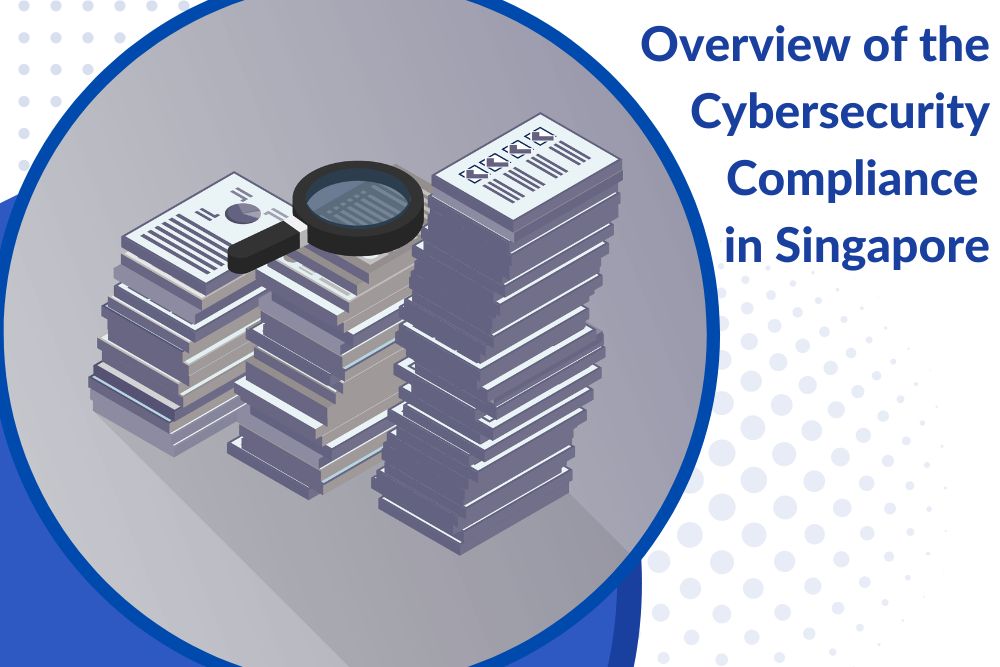
Overview of the Cybersecurity Compliance in Singapore
Singapore is a highly connected country, and its critical infrastructure and enterprises are consequently highly vulnerable to cybersecurity threats. Therefore, the government has taken proactive steps to establish a strong cybersecurity framework and culture, as evidenced by the Cybersecurity Strategy 2019. Initiatives are being taken to develop local skills, raise awareness, and strengthen partnerships in response.
The government also established the Cyber Security Agency of Singapore (CSA) as the central body to lead and coordinate all cybersecurity efforts in order to support its goal of establishing a robust cybersecurity ecosystem. CSA collaborates with various groups to execute initiatives under the Cybersecurity Strategy, including working with firms to create sector-specific standards and norms.
Furthermore, the Singapore government has implemented a number of legislative measures to ensure that businesses and individuals are aware of their cybersecurity responsibilities, as well as to penalise those who do not meet these standards.
In 2012, the Personal Data Protection Act was passed to oversee the gathering, usage, and disclosure of personal data. Businesses are obligated by law to inform individuals of their right to access and correct their personal data, as well as obtain consent for the collection, use, and disclosure of personal data under this legislation. The Computer Misuse and Cybersecurity Act was passed in 2015 to punish activities like unauthorised access to computers and data, and the dissemination of harmful code.
The Singapore Cybersecurity Bill was passed on February 5, 2018, creating a framework for regulating Critical Information Infrastructure (CII) and formalising CII owners' responsibilities in ensuring their CIIs' cybersecurity resilience. A compliance audit of the Cyber Security Code of Practice aids CII operators in meeting standards while maintaining compliance. New technologies and regulatory demands introduce significant changes to CII operators' security measures, making it more difficult to safeguard sensitive infrastructures from potential hazards.
It is essential for CII operators to use a comprehensive risk-based approach that incorporates industry standards to determine the criticality of assets and establish which actions are necessary to protect their installations.
Not only do finance businesses in Singapore have to follow the requirements of many sector-specific cybersecurity frameworks and standards, but they also must comply with additional laws. Payment Card Industry Data Security Standard (PCI DSS) is required for businesses that process credit card payments while financial institutions are obliged to follow MAS Technology Risk Management Guidelines.
Non-compliance with these standards and frameworks may result in financial penalties or, in the case of PCI DSS, the inability to process credit card transactions.

What to Look for in a Security Auditing Company?
There are two types of features to look for when hiring cybersecurity audit companies. The first kind are broad characteristics, such as the number of test cases, manual security testing involvement, and report quality. And then there are smaller yet significant details that shape the impact of the security audit.
We will focus on both types of features and give you a list of what to look for in security audit firms.
- Combination of Manual and Automated Security Tests
You can be certain that the security audit firm will use automated tools to look for vulnerabilities in your systems. Automated scans are quick, but they fall short of manual security testing in terms of depth. You want a company that uses both types of scans, offers a range of SAST, DAST, and software composition analysis approaches, and gives you an overall view of your company's security posture.
- Wide Range of Test Cases
When you get a security audit done, you're also preparing for a compliance audit. Therefore, the security audit provider needs to check your system against popular vulnerability indexes like the OWASP top 10 and the SANS 25. The number of test cases does have an impact on how comprehensive the audit is.
- Comprehensive Audit Reports
Two criteria must be met for a security audit report to be acceptable. The first is thoroughness; the second is actionability. On one hand, the report should cover the entire gamut of test cases, as well as all vulnerabilities and their properties and solutions, but on the other hand, it should simply advise the target organisation what to do.
- Remediation Support
The cybersecurity audit firm should give you all of the tools you need to address the flaws, including a help desk, training sessions for your workers, and ongoing inspections. The security audit firm must give your company a chance to work with cyber experts to correct the problems.
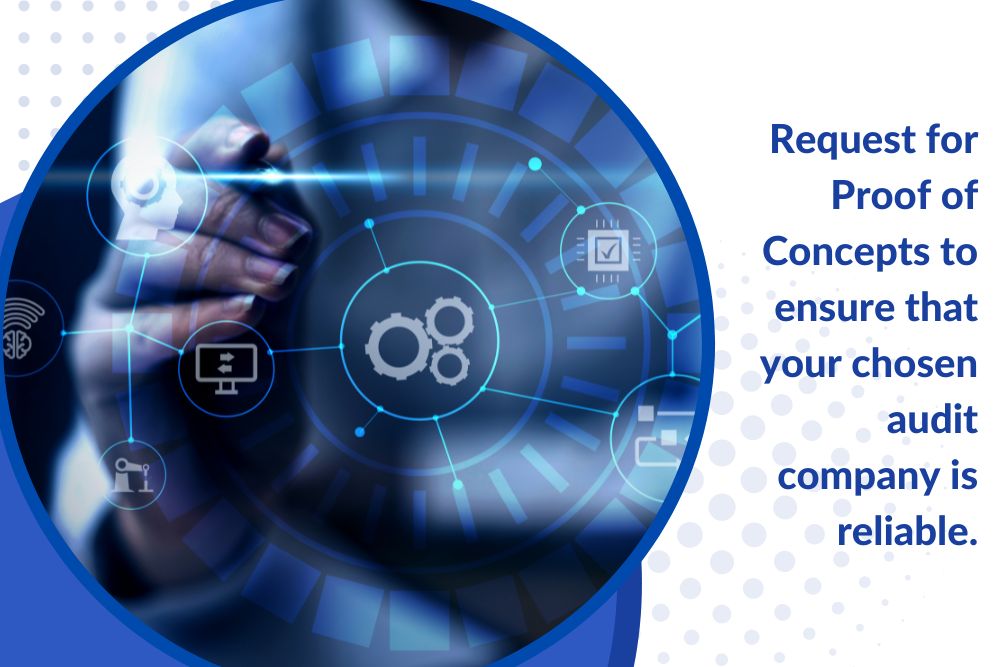
- Ease of Use
How easy a security audit company is to use plays a major part in how effective the cybersecurity audit will be. A top-notch firm will find and mark vulnerabilities for you, give a Proof of Concepts(PoCs), and include clear instructions so that it's an effortless process for you to follow through and fix any issues.
- Compliance Support
Most security audit firms can't provide you with a compliance certificate, but they may help you find the issues that need to be addressed in order for you to qualify for a specific sort of compliance. Some security audit firms offer compliance-specific vulnerability scans as an added service.
- Access Control Review
Access controls restrict access to and use of information systems. They reduce the risk of data being accessed without authorisation, as well as the possibility of a data breach. The audit aids in monitoring user access irregularities. It shows how many times a user has tried to get into something without permission.
- Application Security Audit
A comprehensive application security scan checks the security of the entire web infrastructure. It searches for flaws, vulnerabilities, gaps, and misconfigurations by using a mix of static and dynamic code analysis, business logical flaw testing, configuration testing, and more.
- Threat Modelling
The purpose of threat modelling is to find security requirements, potential vulnerabilities and threats, how critical each vulnerability is, and what the best way to fix them is. There are eight main types of threat models that security auditors use: Attack Trees, CVSS, hTMM, PASTA, Security Cards, STRIDE, Trike, and VAST. Each one provides a different perspective on the risks threatening your IT assets.
Now that you understand security audits, what to look for, and the useful tools for your audit, it's time to start building your own security audit strategy. The frequency and level of depth of your audits will depend on what makes sense for your organisation. The most important part of a security audit is doing it regularly. Any kind of review will be beneficial by giving you a clearer idea of where your organisation stands in terms of security, as well as helping you focus on strengthening efforts more effectively.
Find out how to ensure compliance and build a robust security strategy with one of our highly-recommended security audit companies in Singapore.
Latest Becozon Offer
Boost your business with these exclusive deals by our esteemed Becozon partners
Looking for a CRM software?
Get customisable, cloud-based sales and operations CRM software suitable for any industry. Contact us for a demo today!
Contact Us




